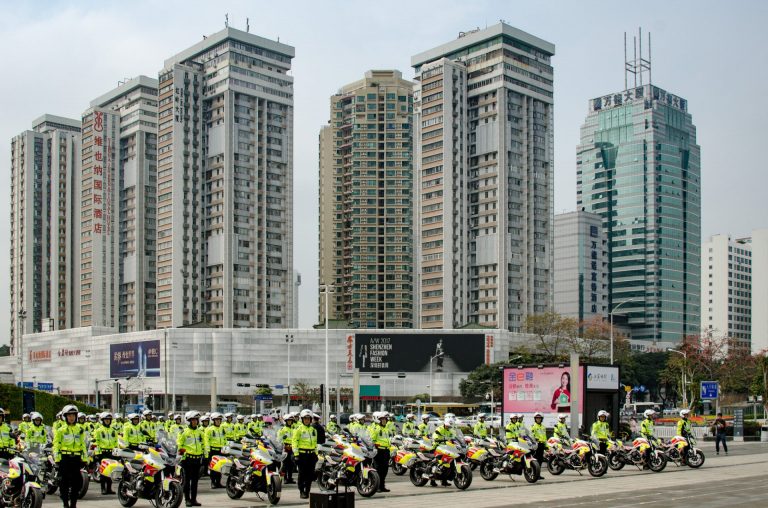The Chinese private sector, having grown extensively in the last several decades, is now on the verge of collapse as China’s communist authorities squeeze companies for profits, and as Beijing maintains an unyielding stance in the Sino-U.S. trade war.
Private businesses along the affluent Chinese coast have long been burdened by the dominance of powerful state-owned enterprises (SOEs), a holdover from the communist regime’s era of planned economics.
Now, an ambitious Chinese tax reform recently designed to funnel more cash into debt-ridden government coffers threatens to exacerbate the effects of tariffs imposed by the United States on over $200 billion worth of imports.
New tariffs from Washington take aim at China’s high-end manufacturing and consumer exports, and the Trump administration may eventually expand them to cover all goods imported to the United States from China.
‘The state advances, the private sector retreats’
Though 40 years have passed since former Chinese regime leader Deng Xiaoping introduced his famous market reforms that propelled China from a Soviet-style third world country to among the world’s biggest economies, the Chinese Communist Party reserves extensive influence over China’s key industries using central and locally managed SOEs.
Success
You are now signed up for our newsletter
Success
Check your email to complete sign up
And as China’s economy slows, there have been voices in the tightly censored academic community calling for less, not more, privatization.
In September, The Epoch Times quoted “self-identified senior financial expert” Wu Xiaoping as writing that “the private sector has already fulfilled its historical mission of helping the public sector to grow by leaps and bounds” and that it was time for the Chinese regime to shift to a “new form” of economic management with “greater centralization and cooperation.”
Chinese observers call the phenomenon guo jin min tui (國進民退), or “the state advances, the private sector retreats.”
Wu’s article, published online and circulated widely, drew speculation about the CCP’s future attitude toward private business. In recent months, the Chinese regime has targeted some of the country’s biggest corporations and punished their executives.
The push for greater state intervention began recently, leaving many firms struggling to meet government regulations.
Southern China’s Guangdong Province was a symbol of the prosperity that Chinese entrepreneurs achieved with the economic freedom that came with Deng Xiaoping’s reforms. Now the local manufacturing sector faces major deficits as the state establishes a stronger grip on the industry.

Shenzhen, in Guangdong Province, was a symbol of the prosperity that Chinese entrepreneurs achieved with the economic freedom that came with Deng Xiaoping’s reforms.. (Image: Anton Strogonoff via Flickr CC BY 2.0)
Thousands of companies in Jiangsu, an eastern province directly north of Shanghai, dropped off an official list of “designated enterprises” as their profits fell. Investments shrank by over $100 billion from last year.
In recent years, as part of its supply-side reform and deleveraging actions, the CCP regime has been trying to unload massive state debt onto the private sector. According to Chinese economics expert He Qinglian, local governments and SOEs are bolstering their positions using favorable economic policies that funnel the profits of private companies into the hands of the government.
“The international community has observed, and Chinese domestic experts have been compelled to admit, that from the perspective of various indicators, China’s financial systemic risks have exceeded U.S. levels that existed prior to the subprime mortgage crisis,” He Qinglian wrote in an article translated and published by The Epoch Times.
The recent tax reform, a revision of Chinese tax law passed by the Standing Committee of the National People’s Congress (NPC) on Aug 31, transferred authority for collecting social security fees from local social security bureaus to local tax authorities starting Jan.1, 2019.
The new tax and social security scheme is expected to cost Chinese firms and workers an additional $300 billion per year.
According to SinoInsider, a New York-based think tank, this means that “over 70 percent of Chinese companies and their employees who paid less social security premiums previously end up paying more from the start of next year. Thus, the taxation and social security changes would result in employees being forced to take pay cuts or lose their jobs.”
Trade war woes
The tariffs imposed on Chinese exports by the Trump administration have left China’s affluent coastal economies hardest hit. Washington’s policies have slashed the Chinese trade surplus by a third since 2017.
Guangdong, Jiangsu, and Zhejiang provinces, as well as the city of Shanghai, which is directly administered by the Chinese regime, all lie on China’s coast and play an important role in the country’s export-oriented economic growth. At its peak, the trade surplus with the United States reached $500 billion.
In 2017, international trade to and from the three provinces accounted for about half the Chinese total, and they exported 56 percent of all Chinese goods going abroad. The local government of Zhejiang Province was the only one across China’s political subdivisions to turn a fiscal surplus between 2014 and 2017, according to SinoInsider. All three provinces and Shanghai have seen their exports dip in the last year.
Follow us on Twitter or subscribe to our weekly email














